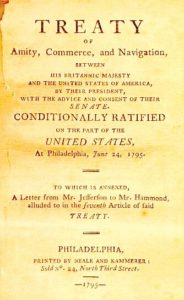Good morning, Whitewater.
Monday in town will be sunny with a high of seventy-eight. Sunrise is 6:10 AM and sunset 7:44 PM, for 13h 34m 11s of daytime. The moon is a waning gibbous with 79.3% of its visible disk illuminated.
The Urban Forestry Commission meets today at 4:30 PM. Whitewater’s School Board meets tonight in regular session at 7 PM.
On this day in 1851, the America wins the first of a series that was to become the America’s Cup:
America was a 19th-century racing yacht and first winner of the America’s Cup international sailing trophy. The Royal Yacht Squadron‘s “One Hundred Sovereign Cup” or “£100 Cup,” mistakenly known in America as the “One Hundred Guinea Cup,”[3] the trophy was later renamed after the original winning yacht. On August 22, 1851,America won the Royal Yacht Squadron’s 53-mile (85 km) regatta around the Isle of Wight by eighteen minutes.[4]
….The race was held on August 22, 1851, with a 10:00 AM start for a line of seven schooners and another line of eight cutters. America had a slow start due to a fouled anchor and was well behind when she finally got under way. Within half an hour however, she was in 5th place and gaining.[8]
The eastern shoals of the Isle of Wight are called the Nab Rocks. Traditionally, races would sail around the east (seaward) side of the lightship that marked the edge of the shoal, but one could sail between the lightship and the mainland if they had a knowledgeable pilot. America had such a pilot and he took her down the west (landward) side of the lightship. After the race a contestant protested this action, but was overruled because the official race rules did not specify on which side of the lightship a boat had to pass.[8]
The result of this tactic put America in the lead. She held this lead throughout the rest of the race. At one point the jib boom broke due to a crew error, but it was replaced in fifteen minutes. On the final leg of the race the yacht Aurora closed but was 18 minutes behind when America finished shortly after 6:00 PM. Legend has it that while watching the race, Queen Victoria asked who was second, and received the famous reply: “There is no second, your Majesty.”[8]
On this day in 1861, a future governor leaves for war:
1861 – (Civil War) Future Gov. Lucius Fairchild departs for the front
The Daily Milwaukee Press reported on this day that Company K of the 1st Wisconsin Infantry presented their Captain, Lucius Fairchild, with a ceremonial sword and sash at Camp Scott in Milwaukee. Fairchild was to leave that same afternoon for Washington, D.C., and begin his new appointment as lieutenant colonel of the 2nd Wisconsin Infantry.
A Google a Day asks a geography question: “The European country that has a half-submerged church in the middle of its largest artificial lake is located in what peninsula?”

